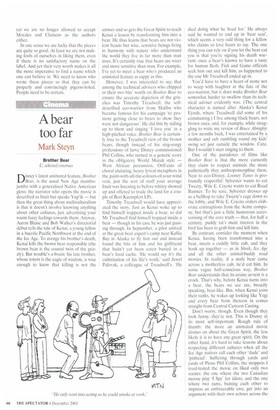The need to know
Peter Phillips
Qne of the pleasures of going to art ‘...igalleries is to look at the people looking at the paintings. I rather sympathise with those who clearly know nothing about the received hierarchy of greatness in painters and who have made something of a daring decision to be there at all. They tend to go up to the first painting they come across and stare at it very hard for some time, wondering what the point of it is. This process may last for three of four works before the realisation that there are hundreds still to go induces a kind of hopelessness, followed by lassitude, resulting in their concentration being broken for good. Then there are those confident, informed types who do the opposite, walking through every room, especially at one-man shows, in order to gain an overview of the whole overwhelming business before fixing on the works they want to return to.
In between these extremes are those who look at the label of every work on display before they deign to look at the paintings themselves. These people need to know that they have heard of the artist in question, that he or she is rated by the world at large, before they can feel confident in enjoying what is before them. Put them in front of a good piece by someone they haven't heard of, and it will stand very little chance of being admired.
Perhaps we all fall into this last category at times. After all, we are not trendsetters and, as with reading generations of commentary on holy writ, there is nothing shameful about following what a tradition of thought has concluded, is there? And there is always the veiled threat of making a fool of oneself if one steps out of line, of liking something which most of one's peers would agree is kitsch, leaving one to maunder ineffectually 'Well, I just liked the way he managed the fruit in that bowl', voice trailing into silence.
This also happens in music, and it has happened rather testingly just recently in my neck of the woods. For a long time, two of the greatest and most splendid examples of eight-voice Renaissance polyphony were held to be by two separate people — Andreas Christi famulus by Cristobal de Morales and Pater peccavi by Clemens non Papa. They were published, performed and recorded as being by these men and the world was very happy with the results.
Change was not wanted or required. Then six years ago an academic, more or less in passing, claimed that these pieces were not by these two famous men, hut by one completely unknown man — Thomas Crecquillon. The reasoning behind his reattributions seemed sound, and we all bowed to his interesting decisions by referring initially to the composer as Crecquillon?, or Morales/Crecquillon, or 'formerly attributed to Morales'. Nowadays we just put Crecquillon.
The logical response to all this is to rate Crecquillon very much more highly than we did before; but this is where the awkwardness comes in. When the discovery first came out we accepted it as we accept the weather: it took quite a while for a more human reaction to come to the surface. Slowly it became clear that no one was at ease with this state of affairs, even though it had been plain immediately that Morales could never have written the motet so long ascribed to him (the attribution of the other one to Clemens is stylistically more likely).
Who was this Crecquillon? Did he really exist, or is someone pulling a fast one? Perhaps his name is an anagram and his existence a simulacrum. The other music one can find by him is not as good as these motets, which may indeed be his masterpieces, but how convenient is that? The fact is we don't fully believe in Crecquillon, yet we are no longer allowed to accept Morales and Clemens as the authors either.
In one sense we are lucky that the pieces are quite so good. At least we are not making fools of ourselves in liking them, even if there is no satisfactory name on the label. And yet their very worth makes it all the more imperative to find a name which one can believe in. We need to know who wrote these pieces so that they can be properly and convincingly pigeon-holed. People need to be certain.



























































































 Previous page
Previous page